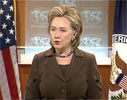
This post originally appeared on The Wonk Room.
In a press conference this morning, choreographed to show a unified front after months of internal bickering, Secretary of State Clinton, U.N. Ambassador Susan Rice, and Sudan special envoy Scott Gration released the official U.S. policy on Sudan.
For the past seven months, President Obama’s special envoy to Sudan, Maj. General Scott Gration, has led the U.S. response to Sudan’s multiple challenges – ongoing humanitarian crisis and political deadlock in Darfur, growing tension between North and South over a 2005 peace deal that is largely unimplemented, and increasing violence in the South in which Khartoum seemingly has a hand. Absent an official policy line, General Gration has had the leeway to implement an approach that many longtime Sudan watchers feel is inappropriately soft on Khartoum. (He even described his strategy as one in which he would hand out “cookies and gold stars” to encourage Khartoum to abide by its commitments.)
Fortunately, the policy paper released today demands accountability and verifiable progress on a wide range of issues before incentives would be deployed — although these benchmarks are not spelled out in detail.
Now is when things get tricky.
The evidence from Gration’s tenure so far — and even more importantly, the heinous 20-year track-record of Sudan’s ruling National Congress Party, or NCP — is unambiguous: Khartoum is not a partner that can be cajoled into behaving in the interests of its people. U.S. diplomacy toward Sudan has tilted dangerously in the direction of appeasement of the NCP headed by a man wanted for war crimes by the International Criminal Court.
Click here to continue reading.
Photo: Secretary of State Clinton at this morning’s briefing.

